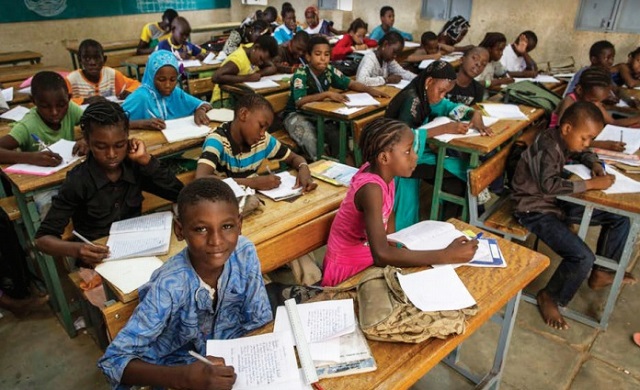
Ntungamo, Uganda | THE INDEPENDENT | Education officials in Ntungamo District and Municipality are challenging the concept of completely free education. They argue that it is a flawed and unrealistic notion, given the government’s limited resources and the increasing demand for quality education across the country.
Led by Fred Bahati, the Acting Ntungamo District Education Officer, the officials note that the government should think twice about rejecting parents’ contributions towards their children’s education, saying that parents’ contributions are part of the pillar upholding many schools across the country.
“The government has tried to support education and it does a good job. But, many schools standing and offering some better education are standing on the shoulders of parent’s contributions, and those that have rejected this are in a very sorry state,” said Bahati.
The education officers made these remarks in a meeting with the Nuwe-Amanya Mushega-led Education Policy Review Commission, which visited the district headquarters to gather their opinions on how to improve the country’s struggling education sector.
Bahati added that the government currently contributes Shillings 20,000 per learner per year for learners in primary, translating to Shillings 6,600 per term. In his view, this amount is insufficient to provide even basic education, let alone the quality education envisioned in the SDGs and Uganda’s development plan.
Christopher Orimwesiga, the Ntungamo Municipal Inspector of Schools, noted that many schools lack basic infrastructure, such as latrines and classrooms. He noted that if parents are organized, they can address some of these issues through financial contributions or in-kind support.
“What is needed is to see how this can be handled so that even those who might not be able to contribute fees or any materials can still keep in school. Historically, many schools were built by communities with the shared goal of improving education for their children,” he noted.
Mathias Ndifuna, the Ntungamo Chief Administrative Officer, also emphasized that public schools rely on PTA support due to the limited resources from the government. He pointed out that some of the fees collected are crucial for addressing unforeseen needs that may not be included in the government budget. According to Ndifuna, waiting for government bureaucracy to address some pressing issues in schools is impractical, and claiming that parents should not contribute at all is erroneous.
Last year, the Cabinet approved a policy to provide total free education for all learners in Universal Primary Education and Universal Secondary Education schools, aiming to eliminate the fees that have been barriers to education and contributed to student dropout rates.
This decision has been incorporated into the UPE-USE draft policy, which outlines that parents are responsible for ensuring their children have food, preferably in the form of packed meals. Additionally, if implemented, parents will be required to provide scholastic materials such as pens, pencils, and school uniforms. However, the government has emphasized that students should not be sent home for lacking these items; they should be allowed to stay at school.
To achieve the completely free education ambition, the government has acknowledged the need for 1.48 trillion shillings to address gaps in staffing, teacher housing, and infrastructure, and to increase capitation among other needs. This funding was anticipated to begin in the financial year 2024/2025, but the government did not allocate any funds for it in the budget.
Bahati said in the absence of adequate funding, the government must focus on empowering parents and communities to support their children’s education as the government supports them. “Free education is a worthy goal, but our government cannot afford it at the moment our communities, and parents can come together and contribute a little to address some of the schools’ needs. This approach will increase parental involvement, which has the added benefit of enhancing the teaching and learning process,” he said.
According to him, what is needed now is to establish guidelines for regulating parental contributions to ensure they address specific needs that the government currently lacks the resources to meet.
Earlier, Francis Gumisiriza Ruhinja, an inspector of schools, highlighted a critical issue in Ntungamo. He pointed out that many schools lack teachers and referred to Buhikira Primary School, which currently has only one teacher and a headteacher. “This is the harsh reality on the ground,” he remarked, questioning rhetorically to the commission members, “If parents don’t pay PTA fees, how will we secure the teachers needed to educate their children?”
In a related development, education officials have expressed serious concerns about Early Childhood Development (ECD) programs, stressing the need for government action. They argued that investing heavily in primary education is futile if the foundational ECD is neglected.
Gladys Turigye, the Ntungamo Municipal Senior Inspector of Schools, proposed to the commission that the government could reduce the primary education cycle from seven to six years. The savings from this reduction could be redirected to strengthen ECD programs, ensuring that every learner receives at least one year of quality early education.
The proposal adds to similar demands from various stakeholders, including Uwezo, which has also advocated for a reduction in primary school years due to the overloaded curriculum. They propose that the government support ECD for one or two years instead.
The 1992 Education White Paper designated ECD as a parental responsibility, and this has largely remained the case. However, some government schools have established ECD units, often staffed by caregivers, including graduates from Primary Seven and Senior Four. These caregivers are not on government payroll and lack formal training for their roles.
The Education Policy Review Commission is currently traveling through the Ankole and Kigezi regions to gather public input on education. The commission plans to engage not only with district education authorities but also with a broad range of stakeholders, including foundational bodies, parents, and students.
*****
URN
 The Independent Uganda: You get the Truth we Pay the Price
The Independent Uganda: You get the Truth we Pay the Price





